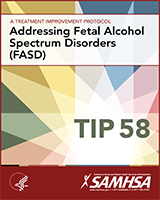From: Chapter 2, Building an FASD Prevention- and Intervention-Capable Agency

Addressing Fetal Alcohol Spectrum Disorders (FASD).
Treatment Improvement Protocol (TIP) Series, No. 58.
Center for Substance Abuse Prevention (US).
Rockville (MD): Substance Abuse and Mental Health Services Administration (US); 2014.
NCBI Bookshelf. A service of the National Library of Medicine, National Institutes of Health.